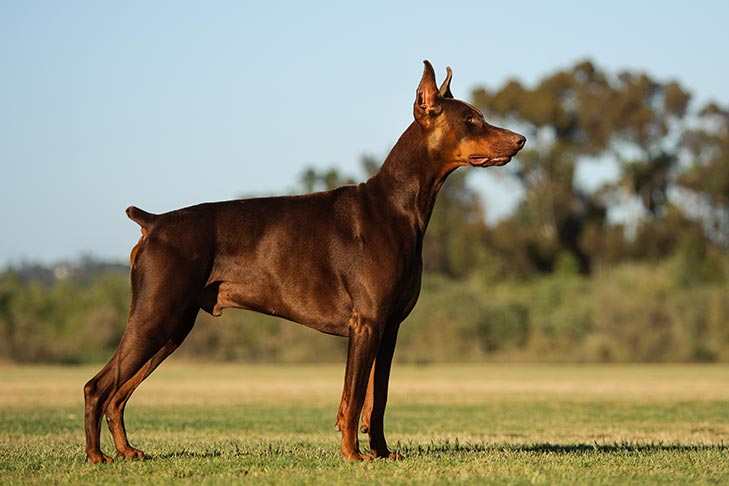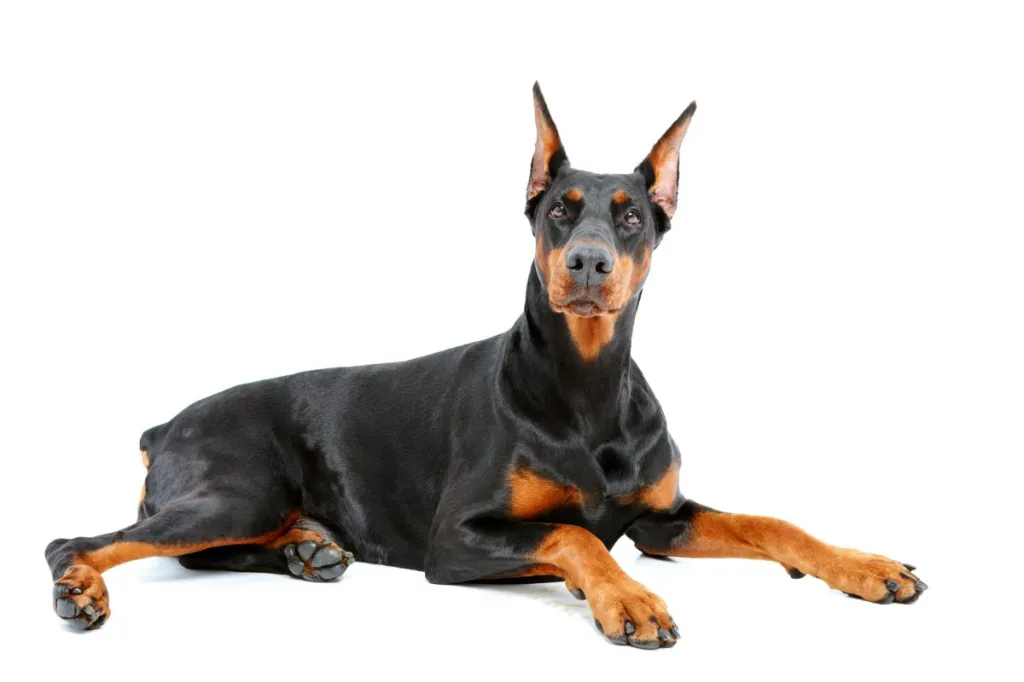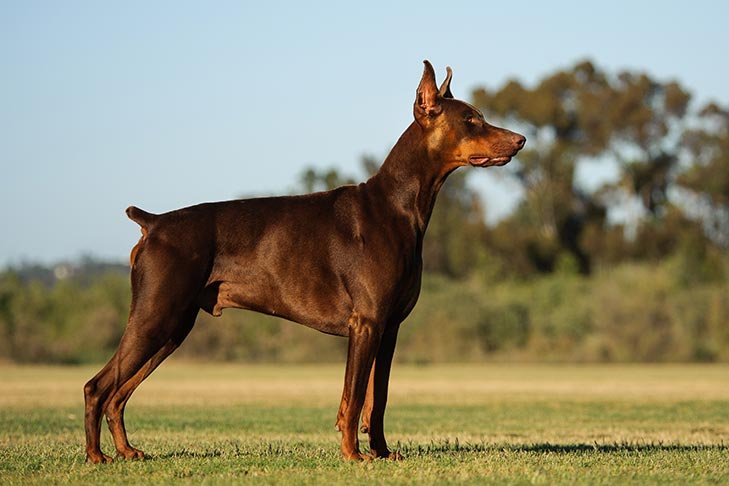When it comes to doberman dogs, there is no denying their striking appearance and powerful presence. With their sleek coats, well-muscled bodies, and alert expressions, they are hard to miss. But did you know that beneath their imposing exterior lies a loyal, intelligent, and highly trainable nature?
Originating from Germany, doberman dogs were initially bred by a tax collector named Louis Dobermann in the late 19th century. He aimed to develop a breed that would make an effective guard dog, companion, and all-around versatile working dog. Fast forward to today, and the doberman’s innate protectiveness, agility, and trainability have made them valuable assets in various roles such as search and rescue, police work, and even therapy assistance.
Doberman dogs are known for their loyalty, intelligence, and athleticism. They are a breed that requires regular exercise and mental stimulation to thrive. With their sleek coats and muscular bodies, they are often seen as powerful and protective companions. However, they are also gentle and affectionate with their families. Training and socialization from a young age are important to ensure they become well-behaved and obedient. Dobermans are also prone to certain health issues, so regular veterinary care is essential. Overall, Doberman dogs are an excellent choice for experienced dog owners who can provide them with the proper care and training they need.

How are Doberman Dogs?
Doberman dogs are renowned for their loyalty, intelligence, and protective nature. They are a breed of working dogs that originated in Germany. In this article, we will explore various aspects of how Doberman dogs are and what makes them unique.
1. Appearance and Physical Characteristics
Doberman dogs are medium to large-sized dogs with a lean and muscular build. They have a square-shaped body with a well-defined chest and a powerful neck. Their coat is short, dense, and comes in various colors, including black, red, blue, and fawn. They have a sleek appearance and exude elegance.
These dogs have a distinctive head shape, with a long and wedge-shaped skull, almond-shaped eyes, and high-set cropped ears (optional). Their tails are typically docked to create a balanced look. Overall, their physique and appearance command attention and convey strength.
2. Temperament and Personality Traits
Doberman dogs are known for their alertness, intelligence, and loyalty towards their families. They are fiercely protective and make excellent guard dogs. Despite their protective nature, they are loving and affectionate towards their owners.
These dogs are highly trainable and eager to please, which makes them suitable for various roles such as therapy dogs, search and rescue dogs, and even competitive obedience. They thrive on mental and physical stimulation, and their intelligence allows them to excel in various training activities.
3. Exercise and Training Needs
Doberman dogs are an active breed that requires regular exercise to keep them physically and mentally stimulated. They enjoy activities such as long walks, jogging, playing fetch, and participating in obedience training sessions.
Providing them with enough exercise helps prevent behavioral issues that may arise due to pent-up energy. They also benefit from mental stimulation, so incorporating training sessions, puzzle toys, and interactive games into their routine is essential.
4. Health and Care
Doberman dogs generally have a lifespan of around 10 to 13 years. However, like any other breed, they are susceptible to certain health conditions. Some common health issues in Dobermans include hip dysplasia, dilated cardiomyopathy, hypothyroidism, von Willebrand’s disease, and cervical vertebral instability.
To ensure their well-being, regular veterinary check-ups, a balanced diet, and exercise are crucial. Providing them with a comfortable and safe environment, regular grooming, and dental care are also essential for their overall health and happiness.
5. Socialization and Family Compatibility
Early socialization is vital for Doberman dogs to develop good manners and a positive attitude towards people and other animals. Exposing them to various environments, sounds, and experiences from an early age helps them become well-rounded and confident dogs.
Dobermans are known for their loyalty and devotion to their families. They form strong bonds with their owners and can be protective of them. However, proper training and socialization can help them become well-behaved and friendly towards strangers and other pets.
6. Doberman Dogs as Family Pets
Doberman dogs can make excellent pets for the right family. They thrive in an environment where they receive plenty of love, attention, and exercise. Families with an active lifestyle and a commitment to their training and socialization needs are well-suited to this breed.
These dogs are known for their loyalty and protective nature, making them great companions and guardians. With proper care, training, and socialization, they can be gentle and loving family pets.
7. Training as Guard Dogs
Due to their intelligence, alertness, and protective instincts, Doberman dogs are often trained as guard dogs. Their natural instinct to protect their families combined with their trainability makes them well-suited for this role.
Professional training, coupled with early socialization, helps them understand their roles and respond appropriately to different situations. It’s important to note that while Dobermans can be excellent guard dogs, they should always be trained using positive reinforcement methods and be provided with a nurturing and loving environment.
8. Frequently Asked Questions about Doberman Dogs
Here are some commonly asked questions about Doberman dogs:
- What is the average size of a Doberman dog?
- Are Dobermans good with children?
- Do Dobermans require a lot of exercise?
- Are Doberman dogs suitable for apartment living?
- Can Dobermans coexist with other pets?
9. Pros and Cons of Owning a Doberman Dog
Here are some pros and cons to consider before bringing a Doberman dog into your home:
| Pros | Cons |
| – Loyal and protective companions | – Require regular exercise and mental stimulation |
| – Intelligent and easily trainable | – Some health issues can be costly |
| – Can excel in various dog sports and activities | – May require a confident and experienced handler |
| – Potential as a reliable guard dog | – Need for early socialization and training |
10. Conclusion
Doberman dogs are impressive and versatile companions. Their loyalty, intelligence, and protective nature make them a popular choice for various roles, from family pets to working dogs. With proper care, training, and socialization, Dobermans can thrive and bring immense joy to their owners’ lives.
Key Takeaways – How Are Doberman Dogs?
- Doberman dogs are known for their loyalty and protective nature.
- They are intelligent and highly trainable, making them popular as working dogs.
- Dobermans have a sleek and muscular appearance, with a short coat that requires minimal grooming.
- They have a reputation for being active and energetic, needing regular exercise to stay happy and healthy.
- Proper socialization and training from a young age are crucial for Dobermans to ensure they become well-behaved members of the family.
Frequently Asked Questions
Here are some common questions about Doberman dogs:
1. Are Doberman dogs aggressive?
Doberman dogs can have a reputation for being aggressive, but it’s important to note that aggression is not a breed trait. Like any other dog, their behavior is influenced by genetics, training, and socialization. Properly trained and socialized Doberman dogs can be loyal, intelligent, and gentle companions.
It’s essential for Doberman owners to provide proper training, socialization, and a loving environment to ensure their dogs develop into well-adjusted and balanced individuals. Early socialization with people, other animals, and different environments helps prevent potential behavioral issues.
2. Are Doberman dogs easy to train?
Doberman dogs are highly intelligent and eager to please, making them generally easy to train. They excel in obedience training and can quickly learn commands and tricks. However, their intelligence also means they may become stubborn or independent if not properly motivated and challenged.
Consistency, positive reinforcement, and reward-based training methods work best with Doberman dogs. Training sessions should be engaging and mentally stimulating to keep their interest and focus.
3. Do Doberman dogs require a lot of exercise?
Doberman dogs are an active breed and require regular exercise to stay happy and healthy. They have high energy levels and need daily physical and mental stimulation. A combination of walks, playtime, and interactive activities, such as agility training or puzzle toys, can help fulfill their exercise needs.
Without enough exercise, Doberman dogs may become bored, restless, or exhibit unwanted behaviors. It’s important to provide them with outlets for their energy to prevent any behavioral issues.
4. Are Doberman dogs good with children?
Doberman dogs can be excellent family pets and get along well with children when properly trained and socialized from a young age. They are known for their loyalty and protective nature, which can make them great companions for kids.
However, due to their size and strength, it’s important to supervise interactions between Doberman dogs and young children to ensure everyone’s safety. Teaching children how to properly interact with and respect dogs is crucial for a harmonious relationship.
5. How do I care for the coat of a Doberman dog?
Doberman dogs have a short, sleek coat that is relatively low-maintenance. Regular brushing with a soft-bristled brush or grooming mitt helps remove loose hair and keeps their coat healthy and shiny. Baths should be given as needed or when they get dirty.
In addition to grooming, regular nail trims, teeth brushing, and ear cleaning are important parts of Doberman dog care. Checking their ears for signs of infection and ensuring their teeth and gums are healthy can help prevent potential health issues.

Doberman Pinscher Dogs 101: Everything You Need To Know – Is It the Right Dog for You?
In summary, Doberman dogs are known for their loyalty, intelligence, and protective nature. They make excellent companions and are highly trainable.
Dobermans have a sleek and muscular build, with a short coat that requires minimal grooming. They have a strong prey drive and need regular physical exercise and mental stimulation.
